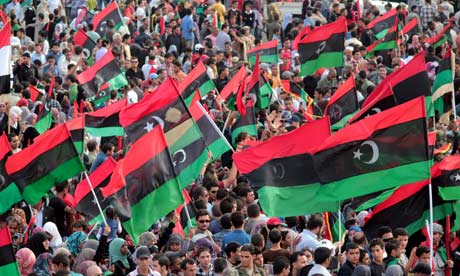http://www.telegraph.co.uk/news/worldnews/africaandindianocean/libya/9172530/70-killed-in-three-days-in-Libya.html

70 killed in three days in Libya
Three days of clashes between tribes in the southern Libyan town of Sabha have killed more than 70 people, according to the government.
Earlier local officials said the fighting pitted the Toubou tribe against Arab tribes in Sebha had eased and efforts to secure a truce were under way Wednesday but the Toubou claimed they were facing a "massacre."
"There are still clashes but not as intense," in Sebha, southern Libya, said Abdelmajid Seif al-Nasser, a town official who quit his post on Tuesday from the ruling National Transitional Council in protest at the violence.
"The national army and a committee of elders have entered the town in a bid to secure a truce," Nasser, who represented the NTC in Sebha, told AFP earlier on Wednesday.
But Toubou tribesmen said rival Arab tribesmen from Sabha were "surrounding" them in the Tayuri and Al-Hijara neighbourhoods and shelling them since the early hours of the morning.
"Al-Hijara is surrounded from all sides. All the Arab (tribes) are against us. They are bombarding us using all sorts of rockets indiscriminately. It is a real massacre," said Karima Jaber, a Sabha airport employee.Toubou chief Issa Abdel Majid Mansur said earlier this week that 40 members of his tribe had been killed, and accused Libyan authorities of using warplanes and tanks against his community.
Speaking to AFP, Mansur denounced what he said was a plan to "ethnically cleanse" his people, and raised the threat of a separatist bid.
Ali al-Dib, a former rebel, said the clashes erupted in the city centre when the Toubou refused to hand over to local authorities one of their men accused of killing a member of the Bussif tribe.
The Toubou are black oasis farmers by tradition who also have connections beyond Libya's borders. They live in southern Libya, northern Chad and in Niger, and have previously denied having separatist ambitions.
The Toubou have also been involved in deadly clashes with another tribe in the Saharan oasis of Kufra, where ethnic groups are locked in a standoff over smuggling.
and.....
http://www.guardian.co.uk/commentisfree/2012/mar/28/libya-federalism-regions-revolution
Libya should embrace federalism
The transfer of power to Libya's regions is the best way forward, following a revolution against stifling central control

Tribal figures in eastern Libya have recently declared the semi-autonomous region of Barqa, with Benghazi as its capital. Photograph: Abdullah Doma/AFP/Getty Images
Just three months before elections take place in post-Gaddafi Libya,clashes between rival revolutionary brigades took place yet again on Tuesday in the southern city of Sabha, leaving more than 30 dead. New Libya is yet to be stabilised: it lacks an effective interim government and it lacks national security forces to impose law and order. These problems persist largely because there is still no consensus on the future definition of the country. Militias refuse to disarm and seek to translate their revolutionary status into political power, while the regions remain disenchanted with the new ruling powers in Tripoli.These problems became apparent two weeks ago when clashes in Benghazi over power-sharing arrangements wounded at least five people and killed one. Those clashes followed events a week before when close to 3,000 tribal figures and representatives in Benghazi, the de facto capital of the uprising and the country's second largest city,declared the autonomous and federal region of Barqa, with Benghazi as its capital.
The move toward federalism is controversial but Libyans should embrace it. The concept is a sensitive one largely because it has become synonymous with partition. The contrary is true though. What federalism ultimately means for Libya is less power for the capital and, therefore, a series of benefits that in the long term will protect the interests of the population. These include preserving Libya's territorial integrity and the harmony of its people, since federalism will ultimately be about the division of power rather than, for example, the division of competing ethnic and ideological groups. The decentralisation that federalism promotes is one that Libyans have been embracing and to which they owe the success of their revolution, given the loose structure that the uprising took shape over the course of nine-months.
While the National Transitional Council was known to the world as the official voice and opposition entity, it was equally a conduit and mouthpiece for the opposition, crucial in garnering international support, aid and arms but not necessarily pivotal since it later became known that brigades had received aid and arms from the Gulf and other states – independently of the NTC. In other words, there was no central control of the revolution. The current political/security framework in the country, including independent revolutionary brigades tied to semi-independent major cities like Misrata – which acts like a state within a state – as well as the NTC's lack of authority is a product of the revolution and provides an ideal environment for federalist authority.
Libyans should embrace federalism as a power-sharing mechanism because, in taking away Tripoli's powers, it seeks to ensure the capital does not become too strong and yet another dictatorial base. Many of the concerns that prompted Benghazi's declaration of autonomy, as well as militias' refusal to disarm and join a national army, centre on this fear (as well as the interim government's failure to fulfil its obligations, its neglect of the regions and shortcomings in relation to transparency).


Tidak ada komentar:
Posting Komentar